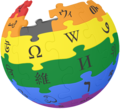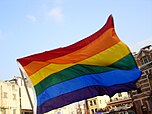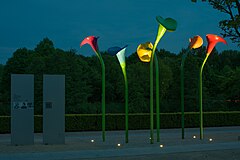| Main page | WikiProjects & Things you can do |
 | The LGBTQ+ Portal |  |  |  |
Introduction LGBT is an initialism that stands for "lesbian, gay, bisexual, and transgender". It may refer to anyone who is non-heterosexual, non-heteroromantic, or non-cisgender, instead of exclusively to people who are lesbian, gay, bisexual, or transgender. A variant, LGBTQ, adds the letter Q for those who identify as queer (which can be synonymous with LGBT) or are questioning their sexual or gender identity. Another variation, LGBTQ+, adds a plus sign "represents those who are part of the community, but for whom LGBTQ does not accurately capture or reflect their identity". Many further variations of the acronym exist, such as LGBT+ (simplified to encompass the Q concept within the plus sign), LGBTQIA+ (adding intersex, asexual, aromantic and agender), and 2SLGBTQ+ (adding two-spirit for a term specific to Indigenous North Americans). The LGBT label is not universally agreed to by everyone that it is generally intended to include. The variations GLBT and GLBTQ rearrange the letters in the acronym. In use since the late 1980s, the initialism, as well as some of its common variants, functions as an umbrella term for marginalized sexualities and gender identities. LGBT is an adaptation of LGB, which in the mid-to-late 1980s began to replace the term gay (or gay and lesbian) in reference to the broader LGBT community. When not inclusive of transgender people, the shorter LGB is still used. (Full article...) Selected article - The first homosexual movement was a socio-political movement which thrived in Germany from the late nineteenth century until 1933. The movement began in Germany because of a confluence of factors, including the criminalization of sex between men (Paragraph 175) and the country's relatively lax censorship. German writers in the mid-nineteenth century coined the word homosexual and criticized its criminalization. In 1897, Magnus Hirschfeld founded the world's first homosexual organization, the Scientific-Humanitarian Committee, whose aim was to use science to improve public tolerance of homosexuality and repeal Paragraph 175. During the German Empire, the movement was restricted to an educated elite, but it greatly expanded in the aftermath of World War I and the German Revolution. Reduced censorship and the growth of homosexual subcultures in German cities helped the movement to flourish during the Weimar Republic. Between 1919 and 1933, the first publicly sold, mass-market periodicals intended for a gay, lesbian, or transvestite readership were published, although they faced censorship lawsuits and bans on public sale after the 1926 Trash and Smut Law. The first mass organizations for homosexuals, the German Friendship Society and the League for Human Rights, were founded in the aftermath of the war. These organizations emphasized human rights and respectability politics, and they excluded prostitutes and effeminate homosexual men, who were considered harmful to the movement's public image. The homosexual movement had limited success with the general public, in part because many Germans believed that homosexuality could be spread as a communicable disease. (Full article...)Selected biography -Josef Kohout (24 January 1915 – 15 March 1994) was an Austrian Nazi concentration camp survivor, imprisoned for his homosexuality. He is best known for the 1972 book Die Männer mit dem rosa Winkel (The Men With the Pink Triangle), which was written by his acquaintance Hans Neumann using the pen name Heinz Heger, which is often falsely attributed to Kohout. The book is one of very few first-hand accounts of the treatment of homosexuals in Nazi imprisonment. It has been translated into several languages, and a second edition published in 1994. It was the first testimony from a homosexual survivor of the concentration camps to be translated into English, and is regarded as the best known. Its publication helped to illuminate not just the suffering gay prisoners of the Nazi regime experienced, but the lack of recognition and compensation they received after the war's end. Kohout's book inspired the 1979 play Bent, by Martin Sherman, which was made into the movie Bent, directed by Sean Mathias, in 1997. (Full article...)Selected quote -—Gordon Brown, UK Prime Minister. Current events
Selected image - Protesters and supporters of same-sex marriage in California, outside San Francisco City Hall in June 2008.
Did you know… -
This month's birthdays
Selected lists
Related portalsFeatured contentThe following articles and lists have been identified as some of the best produced by the Wikipedia community: | Featured lists and topics
|
Topics
Categories
Associated Wikimedia
The following Wikimedia Foundation sister projects provide more on this subject:
- Commons
Free media repository - Wikibooks
Free textbooks and manuals - Wikidata
Free knowledge base - Wikinews
Free-content news - Wikiquote
Collection of quotations - Wikisource
Free-content library - Wikiversity
Free learning tools - Wiktionary
Dictionary and thesaurus






















